Redditor Intends To Keep And Eventually Adopt A "Super Friendly" Cat Whose Owner Won't Keep Inside
Cats have an innate need to explore the "forest" outside, which dates back to their prehistoric ancestors. However, how secure is your feline friend when left outside, whether they are strolling along a fence line, lounging on a roof, scouring the area for rodents or birds, or exploring their ever-growing territory?
Since kitty litter was created in the '40s, cats have been spending more time indoors. You've probably heard people refer to their cats as "indoor" or "outdoor," depending on whether they live inside the home or have access to the outside.
Even though some cats might prefer to be outside, it's frequently better to keep them indoors. When your favorite furry family member escapes, various dangers could come their way.
Many folks don't realize the possible risks until it's too late. The "super friendly" cat in today's post is one who wanders around a lot.
The OP says that the cat has repeatedly tried to sneak into the house behind her, and when she doesn't let her in, she meows at the window. When the cat finally succeeded in getting inside, the OP was surprised at how relaxed and happy the cat was being confined to one room.
Apparently, the cat has an owner, and according to her, the cat "likes to wander around and make new friends." Keep scrolling to read the whole story.
This Redditor wants to take in a friendly cat that her neighbor won't keep inside

This super friendly cat has repeatedly tried to sneak in behind the OP
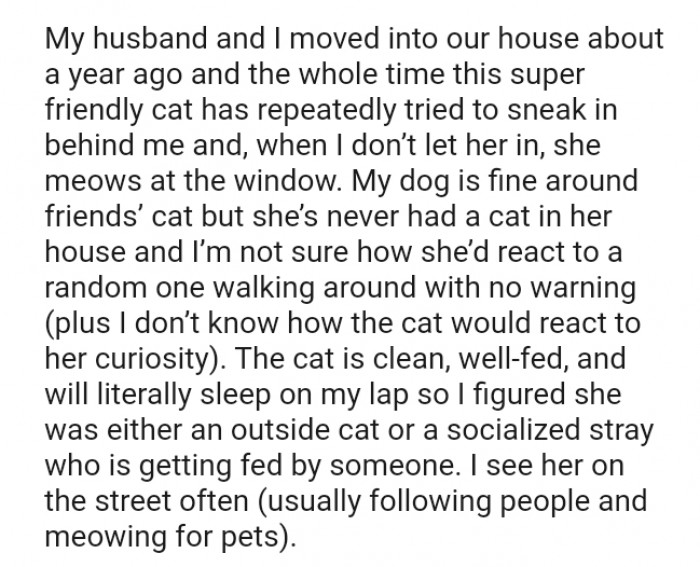
The cat was happy to be confined inside one room
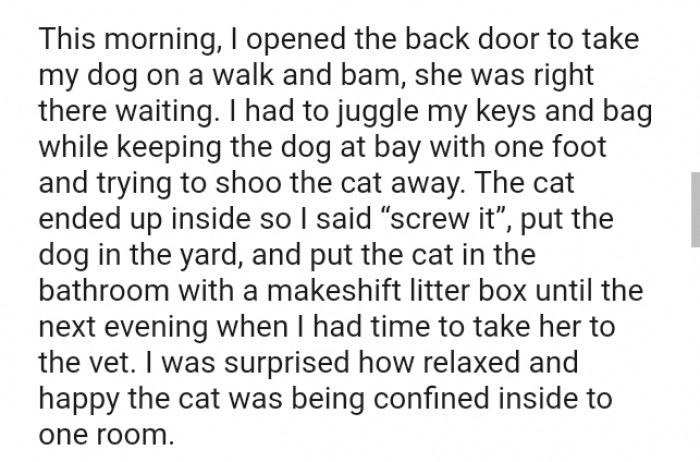
Understanding Emotional Attachment to Animals
The desire to adopt a friendly cat reflects a deep emotional attachment that many individuals feel towards animals. Research in animal-assisted therapy shows that pets can fulfill emotional needs, providing comfort and companionship.
This emotional bond often drives individuals to take action to ensure the well-being of animals, even when it involves potential complications.
The Psychological Implications of Pet Ownership
This scenario raises important questions about the responsibilities and emotional implications of adopting a pet.
Research indicates that pet ownership can significantly impact our mental health, often providing emotional support and companionship.
However, it also entails responsibilities, which can be overlooked in the excitement of adopting a new animal.
She likes to wander around and make new friends
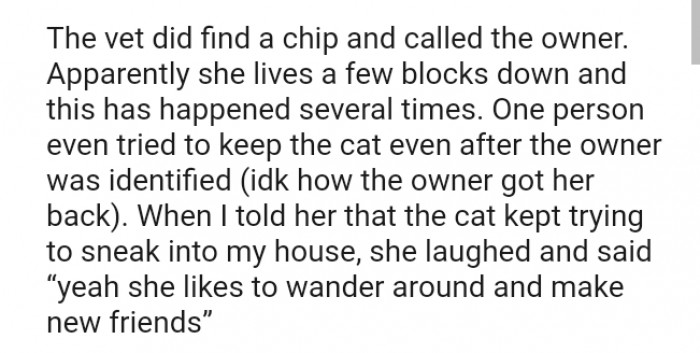
The OP does not think that cats should be allowed to wander
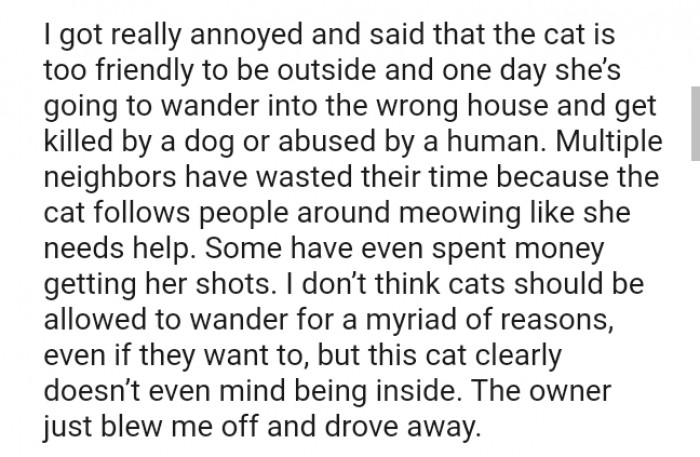
The cat needs to be confined before she gets hurt or hurts herself
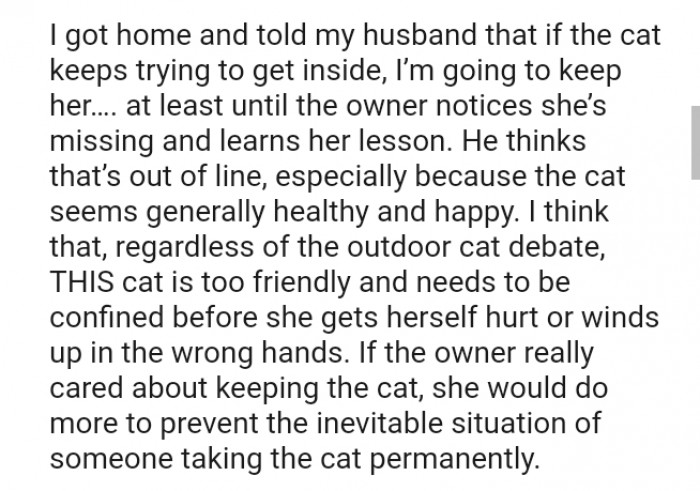
Studies indicate that forming attachments to animals can activate the brain's reward system, releasing feel-good hormones such as oxytocin. This can create a strong desire to nurture and protect animals, as seen in the Redditor's inclination to adopt the cat.
Such behaviors are often reinforced by positive experiences with animals, which further deepen emotional connections.
Understanding the motivations behind adopting a pet can help clarify the complexities of this scenario.
Studies show that individuals often adopt pets during times of emotional need, seeking companionship and connection.
The Redditor's desire to keep the friendly cat may reflect a deep emotional bond forming, which can complicate decisions about ownership.
Clearly, the OP insists on taking in the cat if she keeps trying to get inside the house. Even though it might not be permanent, the OP wants the owner to learn her lesson when she notices the cat's missing.
Some Redditors supported this, while others were against it. Here are some of their replies below...
A lot of coyotes are out there, and they eat cats

You just can't catnip someone else's cat

This Redditor is sure that it's illegal for the cat to be at large
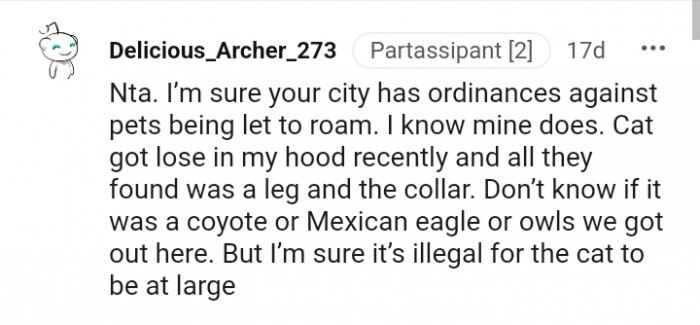
The Ethics of Pet Adoption
Adopting a pet comes with significant ethical considerations, particularly regarding the pet's previous owner and their rights. Research in animal welfare emphasizes the need for responsible decision-making when it comes to adopting pets.
The Redditor's situation illustrates the tension between emotional desires and ethical obligations, highlighting the complexities of pet ownership.
The Role of Social Expectations in Pet Care Decisions
Social expectations surrounding pet ownership can create significant pressure for individuals to act in certain ways.
Research from the University of California indicates that societal norms can influence our decisions about pet care and responsibility, often leading to conflicts.
In this case, the Redditor's decision to keep the cat may be influenced by their perception of what constitutes responsible pet ownership.
You can drop the cat off at the shelter
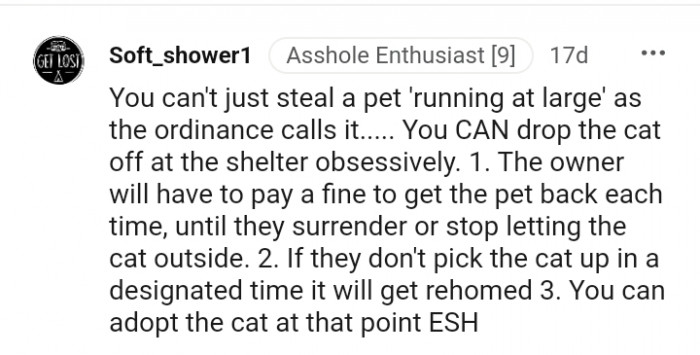
This Redditor is saying where they think it crossed the line
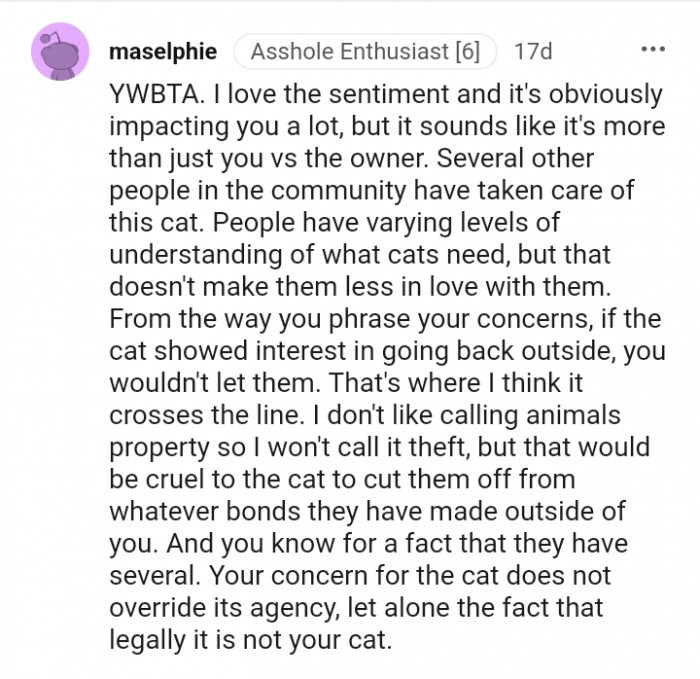
This is what happens to outdoor cats
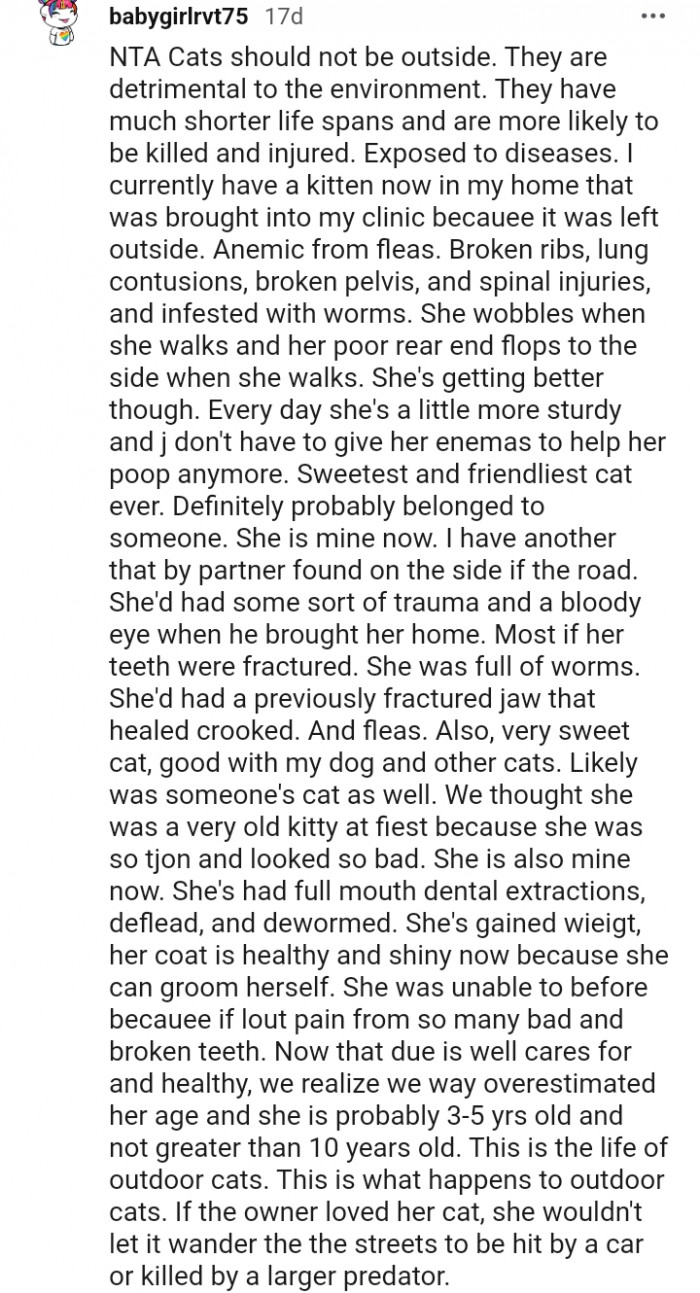
Experts recommend that individuals considering pet adoption reflect on their motivations and the potential impact of their decisions on all parties involved.
Encouraging discussions about the responsibilities and commitments associated with pet ownership can help individuals make more informed choices, balancing their emotional desires with ethical considerations.
Additionally, understanding the emotional connections involved in pet ownership is crucial for navigating these decisions.
Studies show that emotional bonds with pets can lead to protective instincts, often causing individuals to prioritize their feelings over practical considerations.
This emotional attachment can complicate decisions about whether to keep a pet or return it to its original owner.
You can't steal a cat that you know has owners

It is rare to see a super friendly cat

The legal status of the cat as someone else's property does not line up
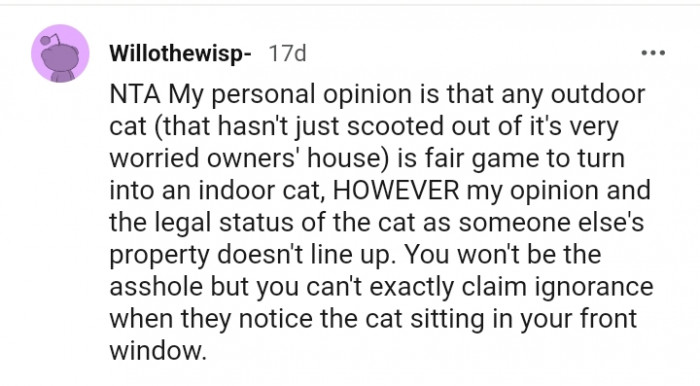
Navigating Interpersonal Conflict in Pet Care Decisions
Disagreements regarding pet care can often lead to interpersonal conflict, particularly when emotions run high. Research shows that effective conflict resolution strategies are essential in addressing differing opinions on pet ownership.
In this case, discussing the implications of adopting the cat can foster understanding and reduce potential tensions between the Redditor and the previous owner.
Practical Recommendations for Responsible Pet Ownership
To navigate the complexities of pet ownership, it’s essential to establish clear responsibilities and expectations.
Engaging in open dialogues about pet care can foster a sense of shared responsibility among community members.
Additionally, seeking advice from local shelters or veterinary professionals can provide valuable insights into responsible pet ownership practices.
Cats need time to adapt to a new environment
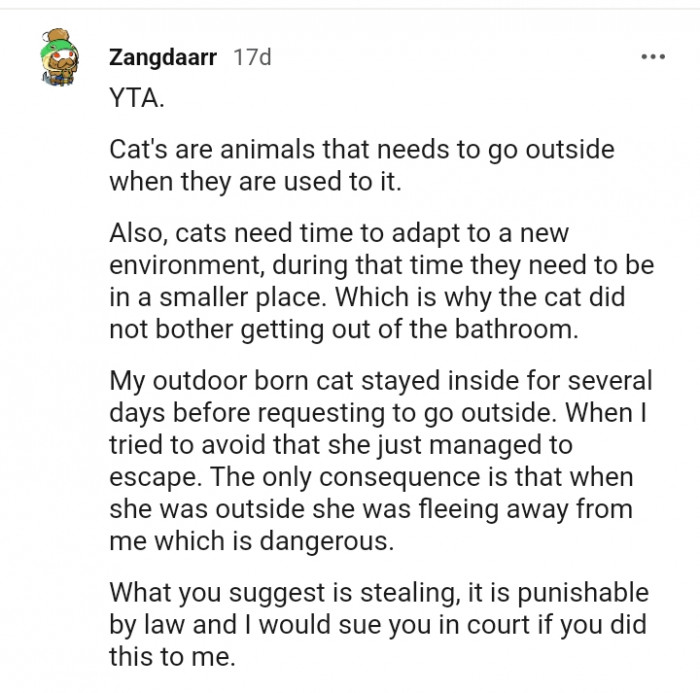
This Redditor is telling the OP to go ahead and keep the cat safe

Well, it's not every day one gets to meet a "super friendly" cat, so we can't totally blame the OP for trying to keep the cat. The owner should know how risky it is to let cats be outside, even if it's just to make friends.
This particular cat happens to be chipped, and chip numbers are unique and unalterable. So it will be very difficult for the OP to keep the cat.
Ultimately, understanding the emotional dynamics involved in pet ownership is crucial for making informed decisions.
Encouraging community discussions about pet responsibilities can enhance awareness and support among pet owners.
Creating a culture of empathy and understanding around pet care can lead to better outcomes for both pets and their owners.
Psychological Analysis
This scenario illustrates the emotional dynamics at play in pet ownership, highlighting the importance of understanding both the emotional and practical responsibilities involved.
Recognizing the complexities of these attachments can guide individuals toward more responsible and compassionate decisions regarding their pets.
Analysis generated by AI
Analysis & Alternative Approaches
This situation highlights the emotional complexities involved in pet ownership and the responsibilities that accompany it.
Research indicates that understanding our emotional attachments can guide more responsible decision-making.
Ultimately, fostering open discussions about pet care and responsibilities will lead to healthier outcomes for both pets and their owners.
Encouraging open dialogues about expectations and feelings can help individuals navigate conflicts more effectively. Utilizing active listening and empathy during discussions can promote a collaborative approach to pet ownership decisions.
Such strategies can enhance cooperation and ensure that all parties feel heard and respected.
Analysis & Alternative Approaches
Navigating the emotional and ethical complexities of pet adoption requires thoughtful consideration and open communication. Research suggests that fostering understanding and collaboration can lead to more responsible and compassionate decisions about animal care.



